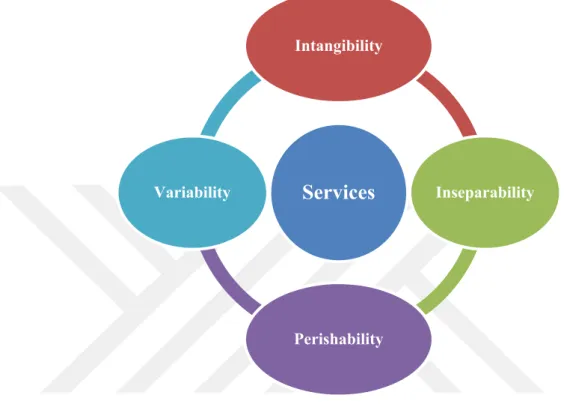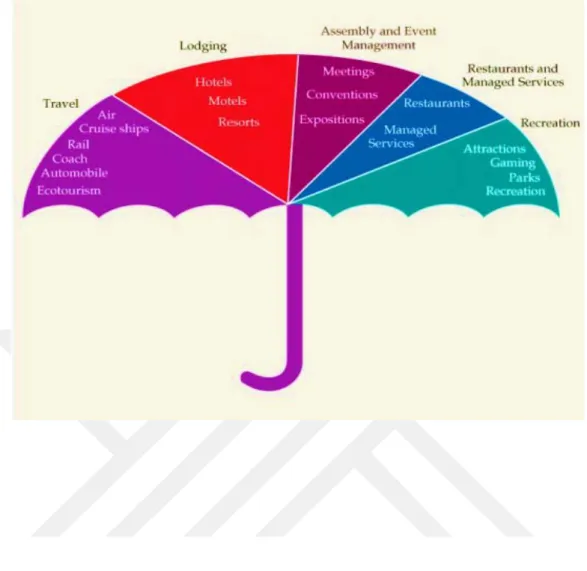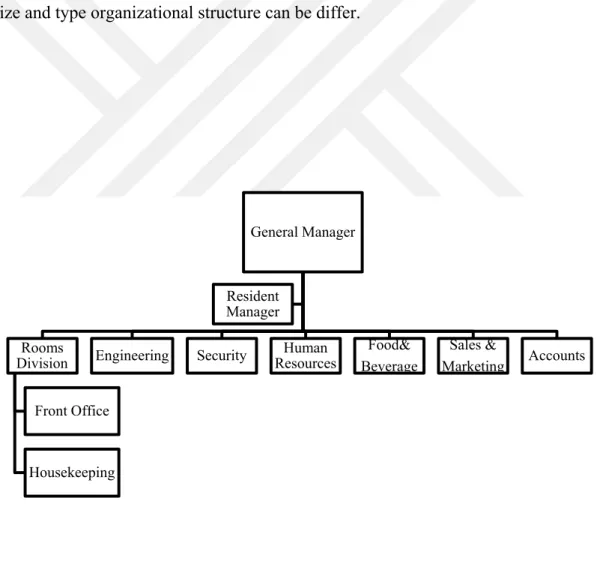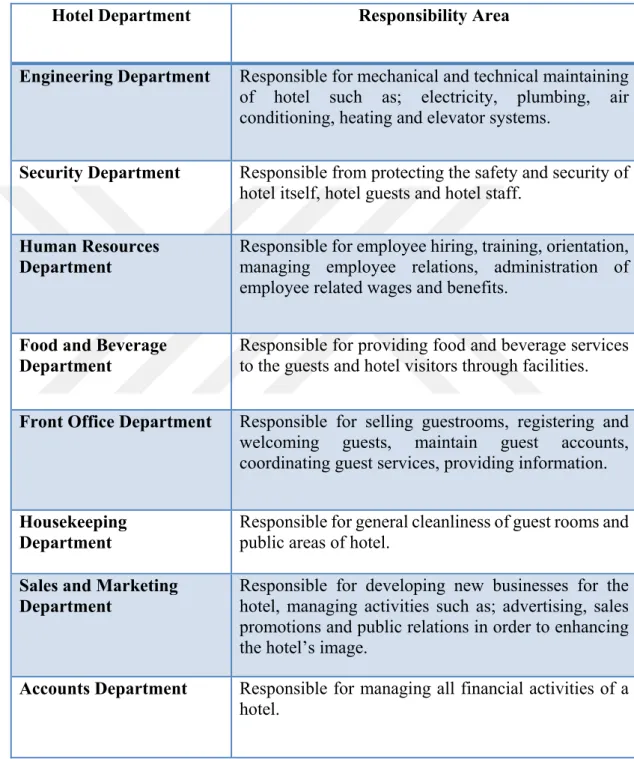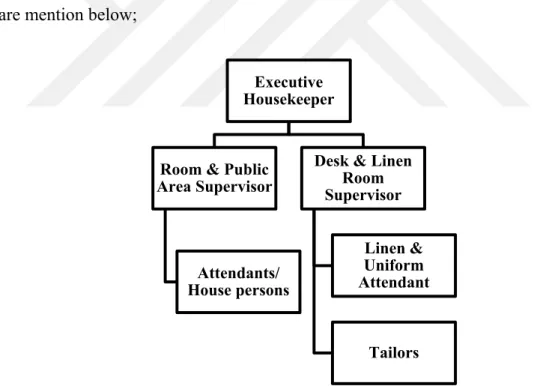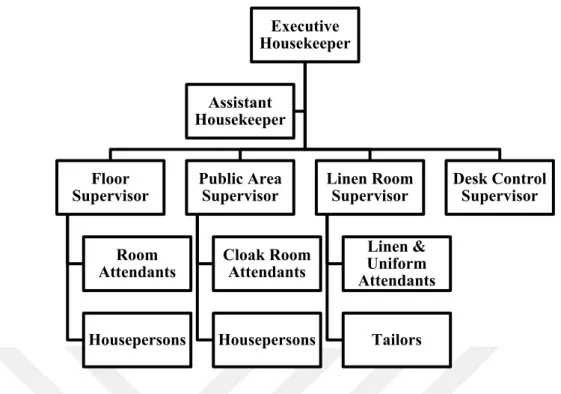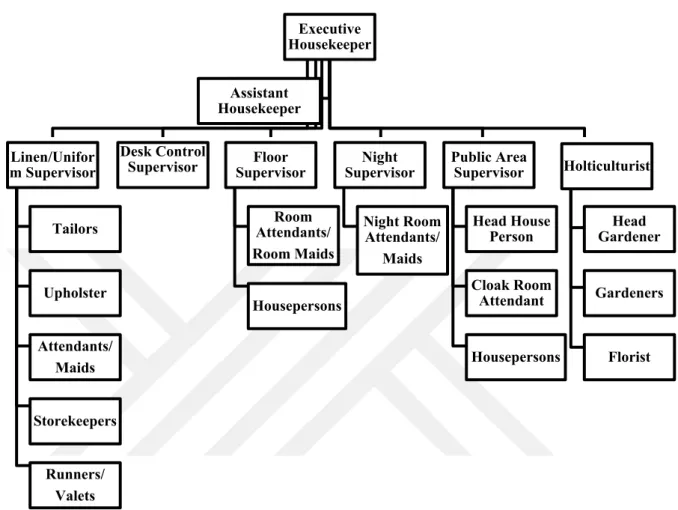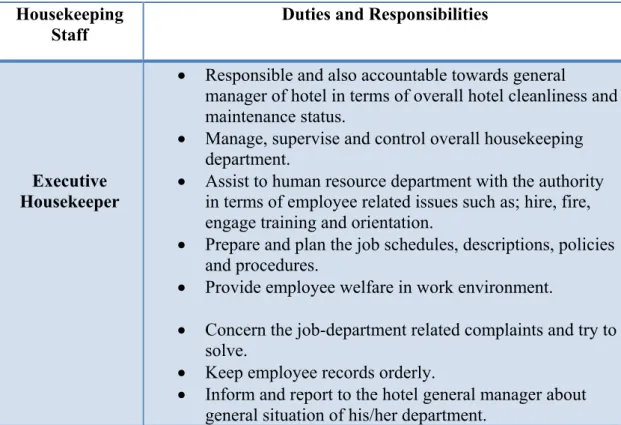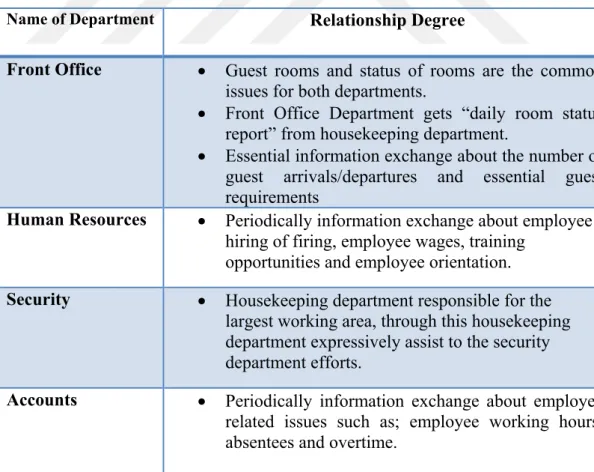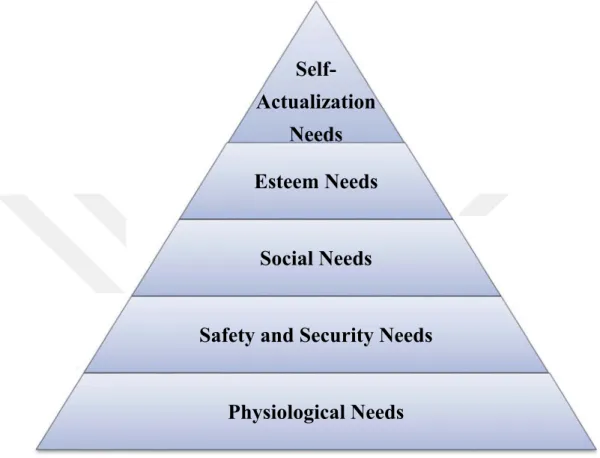T.C.
YAŞAR ÜNİVERSİTESİ
GRADUATE SCHOOL OF SOCIAL SCIENCES DEPARTMENT OF TOURISM MANAGEMENT
MASTER THESIS
QUALITATIVE ANALYSIS ON THE FACTORS AFFECTING HOUSEKEEPING EMPLOYEES’ JOB SATISFACTION IN HOSPITALIY
INDUSTRY: A STUDY IN 5 STAR IZMIR HOTELS
Duygu ÇELEBİ
Thesis Advisor
YEMİN METNİ
Yüksek Lisans Tezi olarak sunduğum “Qualitative Analysis on the Factors Affecting Housekeeping Employees’ Job Satisfaction in Hospitality Industry: A Study in 5 Star Izmir Hotels” adlı çalışmanın, tarafımdan bilimsel ahlak ve geleneklere aykırı düşecek bir yardıma başvurmaksızın yazıldığını ve yararlandığım eserlerin bibliyografyada gösterilenlerden oluştuğunu, bunlara atıf yapılarak yararlanılmış olduğunu belirtir ve bunu onurumla doğrularım.
Tarih Duygu ÇELEBİ
14.07.2015 İmza
ACKNOWLEDGMENTS
First of all, I would like to thank my thesis advisor, Assist. Prof. Dr. Ferika ÖZER SARI, for always being so understanding and patient, for encouraging and supporting me to finish this dissertation in the difficult times when things were not going well. Secondly, I would like to express my gratitude to my other excellent professors and my office colleagues for their endless support and precious motivation during this study. Next, I would like to thank all of my in-depth interview participants for their patient and priceless help. Lastly, I would like to thank my distinguished family and Dumi for always believing in me when I had struggled with this study and making my academic journey so memorable.
« Your work is going to fill a large part of your life, and the only way to be truly
satisfied is to do what you believe is great work. And the only way to do great work is to love what you do. If you haven't found it yet, keep looking. Don't settle. . «
Steve Jobs
ABSTRACT Master Thesis
QUALITATIVE ANALYSIS ON THE FACTORS AFFECTING HOUSEKEEPING EMPLOYEES’ JOB SATISFACTION IN HOSPITALIY
INDUSTRY: A STUDY IN 5 STAR IZMIR HOTELS
DUYGU ÇELEBİ
Yasar University
Graduate School of Social Sciences Master of Tourism Management
Undoubtedly, job satisfaction is the one of the most important issues that is extremely essential in terms of both employers and employees within the today’s competitive business environment. In this regard, employees’ job satisfaction plays a vital role on the success of any business. The principal aim of this dissertation is to reveal the main factors affecting housekeeping employees’ job satisfaction in a hotel industry. First of all, hospitality industry, structure of housekeeping department, the concept of job satisfaction and the main factors affecting employee job satisfaction were identified through a broad literature review. Secondly, data was collected through carrying out structured in-depth interview with five housekeeping managers from different five-star hotels in İzmir. The interviewees for the qualitative analysis were selected through convenience sampling. As a result of conducted interviews, it was found that seven factors; relationship with supervisor, work itself, pay, job security, career development, brand recognition of hotel, and positive relationship with co-workers have positive influence on housekeeping employees’ job satisfaction. In contrast, the result indicated that three factors; working conditions, unfulfilled career development and negative relationship with co-workers have negative influence on housekeeping employees’ job satisfaction. Analyzing positive and negative factors causing job satisfaction or dissatisfaction from different perspectives and making recommendations accordingly will be of great significance to hotel management so as to improve housekeeping employees’ job satisfaction level.
Keywords: Job Satisfaction, Job Satisfaction Factors, Housekeeping Department, Hospitality Industry, Hotel Industry
ÖZET Yüksek Lisans
KONAKLAMA ENDÜSTRİSİ İÇERİSİNDE KAT HİZMETLERİ ÇALIŞANLARININ İŞ TATMİNİNİ ETKİYEN FAKTÖRLERİN KALİTATİF ANALİZİ: 5 YILDIZLI İZMİR OTELLERİ ÜZERİNE BİR
ÇALIŞMA
Duygu ÇELEBİ
Yaşar Üniversitesi Sosyal Bilimler Enstitüsü
Turizm İşletmeciliği Yüksek Lisans Programı
Şüphesiz, hem işverenler hem de çalışanlar açısından oldukça önemli olan iş tatmini, günümüzün rekabetçi iş çevresinde en çok tartışılan konulardan biridir. Bu bağlamda çalışanların iş tatmini, her türlü işletmenin başarısında önemli bir rol oynamaktadır. Bu tezin temel amacı; otel endüstrisi içerisinde yer alan kat hizmetleri departmanı çalışanlarının iş tatminini etkileyen faktörleri ortaya çıkarmaktır. İlk olarak, konaklama endüstrisi, kat hizmetleri departmanının yapısı, iş tatmini kavramı ve iş tatminini etkileyen faktörler geniş bir literatür taraması vasıtası ile tespit edilmiştir. İkinci olarak, araştırmanın yürütülmesi için gerekli olan veriler, İzmir ili içerisinde bulunan beş yıldızlı otellerde kat hizmetleri departmanında yönetici olarak çalışan kişilere uygulanan yarı yapılandırılmış derinlemesine görüşme tekniği ile elde edilmiştir. Görüşülen kişiler kalitatif yöntemlerden amaca uygun örneklem seçme yöntemi ile belirlenmiştir. Yürütülen görüşmeler sonucunda, kat hizmetleri çalışanlarının iş tatminini olumlu yönde etkileyen yedi faktör bulunmuştur. Bu faktörler sırasıyla; yönetici ile ilişki, işin kendisi, maaş, iş güvencesi, terfi/kariyer gelişimi ve otel markasının bilinirliği olarak belirlenmiştir. Buna karşın elde edilen görüşme sonuçlarına göre, kat hizmetleri çalışanlarının iş tatminini olumsuz yönde etkileyen üç faktör bulunmuştur. Bu faktörler; çalışma koşulları, karşılanamayan kariyer gelişimi ve çalışanların diğer çalışanlar ile negatif ilişki içerisinde olması olarak belirlenmiştir. İş tatmini ve tatminsizliğine yol açan faktörlerin farklı açılardan analiz edilmesi ve buna göre önerilerin sunulması otel yönetimi için önemli olmasının yanı sıra kat hizmetleri çalışanlarının iş tatmininin arttırılması açısından da önem arz etmektedir.
Anahtar Kelimeler: İş Tatmini, İş Tatmini Faktörleri, Kat Hizmetleri Departmanı, Konaklama Endüstrisi, Otel Endüstrisi
TABLE OF CONTENTS
QUALITATIVE ANALYSIS ON THE FACTORS AFFECTING HOUSEKEEPING EMPLOYEES’ JOB SATISFACTION IN HOSPITALIY
INDUSTRY: A STUDY IN 5 STAR IZMIR HOTELS
TUTANAK i FORM OF OATH ii ACKNOWLEDGMENTS iii ABSTRACT iv ÖZET v CONTENTS vi
LIST OF FIGURES viii
LIST OF TABLES ix
INTRODUCTION ... 1
CHAPTER ONE: THE HOSPITALITY INDUSTRY ... 3
1.1. Definitions of Hospitality Industry ... 3
1.2. Characteristics of Hospitality Industry ... 5
1.3. The Scope of the Hospitality Industry ... 7
1.3.1. Accommodation (Lodging) Industry ... 9
1.3.1.1. Hotel Industry ... 10
1.4. Place and Importance of Housekeeping Department within the Hotel ... 14
1.4.1. Organizational Structure of Housekeeping Department in a Hotel ... 15
1.4.2. General Duties and Responsibilities of Housekeeping Department ... 18
1.4.3. The Relationship between Housekeeping Department and Other Departments ... 21
CHAPTER TWO: AN OVERVIEW ON THE CONSTRUCT OF JOB SATISFACTION ... 23
2.1. Definitions of Job Satisfaction Concept ... 23
2.3.1. Maslow’s Hierarchy of Needs Theory (Maslow, 1943) ... 28
2.3.2. Herzberg’s Two Factor Theory (1959) ... 31
2.3.3. McGregor’s Theory X and Theory Y (1960) ... 33
CHAPTER THREE: THE MAIN FACTORS THAT AFFECT JOB SATISFACTION ... 35
3.1. Pay ... 38
3.2. The work itself ... 39
3.3. Career Development ... 40
3.4. Relationship with Supervisor ... 41
3.5. Relationship with co-workers ... 42
3.6. Working Conditions ... 43
3.7. Job Security ... 43
CHAPTER FOUR: METHODOLOGY AND RESEARCH ... 45
4.1. Methodology ... 45
4.1.1. Purpose of the Research ... 45
4.1.2. Research Methodology ... 45
4.1.2.1. Data Collection and Research Sampling ... 45
4.1.3. Limitations ... 46
4.2. Findings ... 46
4.2.1. In-Depth Interview Results of Hotel A ... 46
4.2.2. In-Depth Interview Results of Hotel B ... 50
4.2.3. In-Depth Interview Results of Hotel C ... 53
4.2.4. In-Depth Interview Results of Hotel D ... 56
4.2.5. In-Depth Interview Results of Hotel E ... 57
CONCLUSION ... 61
REFERENCES ... 64
APPENDIX ... 72
LIST OF FIGURES
Figure Page
Figure 1: Four Characteristics of a Service 6 Figure 2: The scope of Hospitality and Tourism Industry 8
Figure 3: Main Hotel Departments 12
Figure 4: Organization Chart of a Housekeeping Department in a
Small-Sized Hotel 15
Figure 5: Organization Chart of a Housekeeping Department in a
Medium-Sized Hotel 16
Figure 6: Organization Chart of a Housekeeping Department in a
Large-Sized Hotel (Chain Hotels) 16
Figure 7: Organization Chart of a Housekeeping Department in a
Large-Sized Hotel 17
Figure 8: Hierarchy of Needs Theory 29
Figure 9: Results of Herzberg’s Two Factor Theory 33 Figure 10: Main Factors that Affect Employee Job Satisfaction 41
LIST OF TABLES
Table Page
Table 1: Responsibility Areas of Main Hotel Departments 13 Table 2: General Duties and Responsibilities of Housekeeping Department 18 Table 3: Relationships of Housekeeping Department with other departments 21 Table 4: Adaptation of Hierarchy of Needs Theory to the Job Satisfaction 30
Table 5: Hertzberg’s Two Factor Theory 31
Table 6: Comparison of McGregor’s Theory X and Theory Y 34
Table 7: Interviewee List 51
Table 8: Summary of Hotel A Interview Results 55
Table 9: Summary of Hotel B Interview Results 58
Table 10: Summary of Hotel C Interview Results 61 Table 11: Summary of Hotel D Interview Results 62 Table 12: Summary of Hotel E Interview Results 64 Table 13: Summary of All Factors Derived From Interview Findings 65
INTRODUCTION
Non- arguably, as a concept “job satisfaction” is the most widely discussed issue that extremely essential for both employers and employees within the today’s competitive business environment. According to Hoppock (1935), the term of job satisfaction described as an “any combination of psychological, physiological and environmental circumstances” that may cause to employee job satisfaction in work place. Job satisfaction is highly crucial in terms of its strong and striking effects on employees’ work and general life satisfaction. In this context, if employees satisfy within the work place, this will increase both their general life satisfaction and success of organization correspondingly.
The purpose of this study is to determine the main factors that affect housekeeping employees’ job satisfaction in 5 star İzmir hotels. In the first chapter of this dissertation, hospitality industry is discussed in all its parts. The chapter is beginning with the definition of hospitality industry, which has a complex nature and includes wide category of services such as; accommodation, food and beverage, transportation, tourism services, and other related services within itself in order to make guests feel welcomed when they are away from their usual environment. Within the same chapter, characteristics and scope of hospitality industry are studied to ensure a better understanding of the place and importance of housekeeping department within the hotel business. The chapter is concluded with the detailed explanation of organizational structure, departmental relationships, general duties and responsibilities of housekeeping department. Main purpose of this chapter is to reveal the housekeeping employees’ working environment with all aspects before their job satisfaction would be discussed.
In the second chapter of this dissertation, job satisfaction concept and its importance was discussed broadly in an attempt to comprehend the vital role of employee job satisfaction on the success of any company within the competitive business environment. Employee related issues such as; employee needs, employee expectations, employee behaviors and attitudes which act as strong determiners of employee’s job satisfaction in a work environment was considered under the title “theoretical approaches to job satisfaction” and the chapter concluded with
Needs Theory, Herzberg’s Two Factor Theory and McGregor’s Theory X and Theory Y.
The third chapter of this dissertation aim to reveal the main factors that affect employee job satisfaction in a work place. Within the same chapter, determination of “what makes employees feel satisfied towards their job” was discussed and the chapter continues with the explanations of factors that determined through broad literature as following: pay or remuneration, the work itself, relationship with supervisor, career development, working conditions, job security and relationship with co-worker.
In the fourth and final chapter of the dissertation, methodology of the study and findings derived from interview results have been represented respectively. Methodology part divided into four categories, as following; research objectives, research design, research sampling and data collection in order to display the research approach of this dissertation deeply. The research is based on broad literature reviews and structured interviews conducted with managers who work within the housekeeping departments of 5 Star İzmir Hotels.
This research addressed three primary questions;
1) What is the importance of housekeeping department in a hotel?
2) What are the factors that affect housekeeping employees' job satisfaction in a positive way?
3) What are the factors that affect housekeeping employees' job satisfaction in a negative way?
In the final part of the chapter, interview results were presented at first, and then main factors that affect housekeeping employees’ job satisfaction were determined, analyzed and divided into two categories as positive factors and negative factors.
CHAPTER ONE
THE HOSPITALITY INDUSTRY 1.1.Definitions of Hospitality Industry
Although the term of hospitality has an extensive meaning, originally “hospitality” word comes from an old French word “hospice” with the pure meaning of ensuring care or lodging for visitors and “house of rest” (Lauková, 2006).
According to Macmillan English Dictionary, hospitality word has explained as a kindly host behavior towards the guests in an attempt to make them feel welcomed when they are away from their usual environment temporarily. On the other hand, Cambridge English Dictionary defines the hospitality industry as components of diverse businesses in order to offer food, beverage or place to rest to the guests basically. As it is seen, the definitions of hospitality and hospitality industry support each other that can be referred as a relationship among the visitor and host which begin with a friendly welcoming and then continue through the taking care of basic needs of guests in terms of food, beverage and accommodation services.
Essentially, hospitality industry can be defined as; one of the world’s most significant, biggest, fastest growing service oriented and labor intensive multi-billion dollar sector in all around the world that supply several type of products and services to the customers when they away from their homes. During the entire stay, making a guest welcomed, comfortable and relax are the primary aims of the hospitality industry.
Generally, hospitality industry has referred as a key player within the competitive global economy which makes an essential contribution to the country economy by extension to this; industry provides job opportunities to many businesses and employs a large percentage of employees. According to Pandey (2011), fastest developing nature of hospitality industry act as a ray of hope for developing or underdevelopment countries which has strong beneficial effects in terms of creating new job fields, exchange earnings and capital investment.
accommodation, food and beverage, travel and tourism services, transportation and other related services within itself. Woods (1989) supported this and attracted attention to unique and extraordinary nature of the industry in terms of generalization of various types of organizations with the intent of supply services to the guests according to their expectations.
As required by nature, hospitality industry not only produces tangible products to the customers such as; hotel room, meal and beverage but also intangible ones too. In other words, hospitality industry includes both intangible and tangible service product which differ the industry automatically from other industries, especially those that produce only tangible products.
Rust and Oliver (1993) stated that, alongside the physical product; the way of service delivery by staff and atmosphere of service environment are the components of the hospitality product too. According to Mackenzie and Chan (2009), products and services are not enough to display the success degree of hospitality industry; the employee quality and the way of their effective service delivery are highly important too. To put it simply, tangible and intangible services are the main ingredients of hospitality industry and both are required in terms of organization effectiveness, success and satisfactory hospitality experience of guest. In this context, producing an intangible product is the main difference of hospitality industry according to other industries.
Basically, hospitality industry can be well-defined as people oriented business. This structure cause to some challenges in terms of inadequate standardization of service product and little controlling level of work environment. Based on this view, other industries can stop the production process temporarily and cope with the problem itself till the solve it.
In contrast, hospitality industry has no chance to stop or pause the production phase when business face with the problem because of continually nature of industry. This feature of hospitality industry is the second indicator of difference nature of hospitality businesses.
Third difference is highly related with the working conditions of hospitality industry. Undoubtedly, hospitality industry is under the influence on long working
hours, heavy work load and shifts system. When comparing the industry with other commercial organizations, working more than 60 hours and six days a week (include weekends, festivals, special days and holidays) is derived from nature of hospitality industry and also this situation is extremely usual for service employees.
To be truthful, being an employee in the complex and competitive nature of hospitality industry is quite difficult than other industries and depend on some personal characteristics, qualities, abilities and skills of employee. According to Walker (2006), being a team player, honest and hardworking within the organization is highly important. In addition to these personal characteristics he added that; coping with stress, having a desire to meet customer expectations, good communication talents and effective decision making skills are required job specialties of hospitality industry.
During the last few years, the nature of hospitality industry has been affected by fundamental changes within its structure and society. When compared to past, today quite a few numbers of guests prefer to dine out frequently and using numerous types of hotel facilities which can be shaped easily according to their needs by hospitality industry. This situation is welded from the rapidly changeable nature of hospitality industry which under the influence on constantly updated customer preferences through developing technologies and changing economies.
1.2.Characteristics of Hospitality Industry
Majority of hospitality organizations run on 24 hours a day, 7 days a week and 365 days a year in order to meet the guests’ needs and expectations continuously. Producing a guest satisfaction is the main result of hospitality industry which differ its nature and structure from other businesses (Walker, 2006 pp: 7-8).
The characteristics of hospitality industry are derived from the basic features of services which were divided into four and also referred as;
Intangibility (cannot be seen, tasted, touched, heard or smelled), Heterogeneity (standardization is difficult),
Inseparability (services are produced and consumed at the same time-at the same place),
Perishability (service capacity cannot be stored, saved, returned, or resold) (Lovelock and Gummesson, 2004; Kotler and Keller, 2007; Kotler and Armstrong, 2011).
Figure 1: Four Characteristics of a Service Source: Kotler and Keller, 2007.
The distinctive characteristic of services separate them from goods is the intangibility feature which refers to services cannot be seen, felt, tasted, smelled or touched before experienced by guests; they are performances or experiences (Winsted and Patterson, 1998). It is difficult to evaluate service before the experience (Kotler, et al., 2003). The hospitality services are just for the guest’s use only, not for possession (Walker, 2006 pp: 8) as services cannot be protected through patents, the hospitality services are imitated easily by competitors. Also services cannot be stocked that’s why it is difficult to manage fluctuating customer demands (Lovelock and Gummesson, 2004; Kotler and Keller, 2007).
Services
Intangibility Inseparability Perishability VariabilityHeterogeneity or known as variability, of hospitality service means that the
quality depends on who provides them and when, where and how (Kotler, et al., 2003). The quality and presentation of the service varies from one producer to another, from one customer to another, and from a day to another day (Zeithaml, et. al., 1985) due to the labor intensiveness of the service type like hospitality industry.
Inseparability refers to that services are first sold then produced and consumed
simultaneously (Regan, 1963), in contrast goods are first produced, then sold and then consumed (Zeithaml, et. al., 1985). Thus the customer becomes a part of the hospitality service production.
The other unique feature of hospitality industry is the perishability of the service product. For example; the unsold rooms in total capacity mean nothing in terms of revenue for that night for the hotel (Walker, 2006 pp: 8). In other words, if overall service capacity cannot be utilized effectively within the same day, service will become perishable and revenue will lost forever because of the reason that service products cannot be stored in order to later use or sale.
1.3.The Scope of the Hospitality Industry
The scope of hospitality industry is highly extensive and varied by several service oriented businesses such as; accommodation, food-beverage, transportation and other tourism related services which ranging from basic organizations to worldwide corporations. Structure of hospitality industry; considerably resemble the large umbrella which can cover all service oriented businesses within it.
According to Figure 2, the structure of developed hospitality industry consists of too many service oriented businesses such as;
Accommodation services, Transportation services, Event planning services, Food and beverage services Recreation services.
Figure 2: The scope of Hospitality and Tourism Industry Source: Walker, 2006 p: 7.
Simply, hospitality industry provides a range of accommodation services include motels, hostels, hotels and resorts which can range from small, middle size lodging types to luxury large size alternatives according to their offered service variety.
Transportation can be referred as types of travel oriented services include air, cruise, rail and automobile. In addition, meetings, conventions and expositions are the main components of event planning services within the hospitality industry. Food and beverage services cover a range of facilities that provide food and beverage amenities for guests such as; all type of restaurants, cafeterias, coffee shops and bars. Lastly, recreation services include variety of attractions and gaming parks.
As has already been mentioned, it is obvious that hospitality industry covers several types of services such as accommodation, food-beverage service and transportation, etc. in order to welcomed the guests and meet their expectations. According to these components accommodation has a vital importance within the tourism and hospitality industry (Biederman et. al., 2008).
1.3.1. Accommodation (Lodging) Industry
Accommodation or also known as lodging industry is the largest and most ubiquitous component of hospitality industry that growing in importance day by day. In general, this vital industry can be described as a place or establishment which tourists/travelers can rest, revive, stay and find various types of facilities within it.
Accommodation industry plays an important role on the development of tourism in general and also destinations too. The level of quality and range of accommodation facilities may affect and pull the numerous types of visitors to a particular destination. Thus, accommodation industry acts as a part of tourism development strategy and can be referred as a main component of hospitality industry that provides the significance local and national level of economic contribution to the destinations.
In addition to these, accommodation/lodging industry is under the influence of great diversity of accommodation businesses in terms of size, type and organization. This diversity ranges from: low capacity to high capacity, basic home-style facilities offerings to luxury and private ownership to joint ownership and management.
Moreover, Barron and Baum (2008) stated that, accommodation sector divide into eleven according to their functions and types of service offerings such as; hotels, guest houses (bed-breakfast, farmhouse, inns), self-catering accommodation (apartments, cottages, etc.), campus accommodation, time-share, youth accommodation, camping and caravan sites, medical facility accommodation, cruise liners and ferries, trains and aircraft related accommodation and lastly visiting friends and relatives.
As it mentioned before accommodation industry is the main component of the hospitality industry that their characteristics are resembled in a same way. Those can
Accomodation industry comprise both intangible and tangible products within its nature.
Services that offered by accomodation industry are consumed just as the services are produced.
Produced services are extremely perishable which cannot be inventoried for the next time.
Accomodation industry is a labor intensive industry that the service qualitiy depands on the close cooperation between departments and personnels. The basic philosophy in accomodation industry is to meet customer
requirements and to get back the given value with revenues and loyal customers.
1.3.1.1.Hotel Industry
Traditionally, hotels are the most important and visible sub-sector of accommodation facilities which have taken part in the wide scope of hospitality industry. According to Cambridge English Dictionary, the term of hotel is a “place where guests pay to accommodate when they are away from home”. In this context, hotels can be explained as commercial establishments that provide lodging at first and then other facilities to visitors with a view to please them on a short-term basis within the hotel atmosphere.
Anciently, the “hotel” word known as simple inns that were provided only limited services to the visitors. Through the emerging developments in hospitality and tourism industry, simple inns had improved and enhanced their standards in terms of size, number, type and service offerings. In Chakravarti’s (2009) point of view, hotel is defined as a place through two main dimensions namely; food and accommodation as well as other services that provided for the guests in order to gain profit.
Same as hospitality and accommodation industry, hotel business has special characteristics within its nature which display the observable difference among the hotel and other commercial industries (Vallen and Vallen, 2009 pp: 12-13). Those special characteristics can be listed as follow;
Perishability: Unsold vacant rooms of hotel are extremely perishable which cannot be stored, sold, saved or used for next time. There is no opportunity to sell the vacant room from yesterday.
Location: The location of hotel is awfully essential because hotel buildings have fixed and unmovable structure which under the influence of the exterior environment of hotel. Changes in social, political and economic which challenges derived from where the hotel is located can easily affect the hotel business in a positive or negative way.
Fixed Supply: Not only hotel location but also supply of hotel has a fixed nature too. Cause of the nonadjustable nature of customer demands, hotels cannot add or remove employees within the hotel organizations.
High Operating Costs: Unlike other commercial industries, hotel industry depends on both capital and labor-intensive. The result is high operating costs which not be affected by increasing or decreasing number of room sales and continue whether or not the hotel has demand. Taxes, maintenance costs, employee wages, telephone or internet bill, advertising and marketing costs can be referred as fixed costs that continue under the influence of high degree demand or low degree demand.
Seasonality: Seasonality depends on type of hotel business and has a strong relationship with seasonal demand variations of hotel customers. The hotel occupancies can range from increase in the high season.
According to Mackenzie and Chan (2009), hotel business can be classified according to size, function, location, market segment, rating, and property distinctiveness. In this context, they classified the hotels as; city center hotels, airport hotels, suburban hotels, highway hotels/motels, convention hotels, commercial hotels, resort hotels, spa hotels, timeshares, casino hotels, all-suite hotels, boutique hotels and extended stay hotels. In addition to this view, Vallen and Vallen (2009) stated that; hotel classification can be done according to size, class, type, plan and variation on the themes of hotels.
On the other hand, Walker (2006, pp: 137) indicated that, hotel classification divide into three in relation to their location, variety of services offered and price. He classified the hotel industry according to these factors such as; city center (business) hotels, resort hotels, airport hotels, freeway hotels, casino hotels, economy hotels, extended stay hotels and bed & breakfast hotels. This type of hotel varieties can associate with the hotel selection of customers according to meeting level of their needs, desires and expectations from hotel industry.
Hotel departments are highly essential in an attempt to better understand the pure structure of hotels and how the organization fits each other within the hotel environment. In generally, hotel departments are basically same which include several diverse departments with different duties and responsibilities but according to hotel size and type organizational structure can be differ.
Figure 3: Main Hotel Departments
Source: Mackenzie and Chan, 2009 pp: 15. General Manager
Rooms Division
Front Office
Housekeeping
Engineering Security ResourcesHuman Food& Beverage
Sales &
Marketing Accounts Resident
Table 1: Responsibility Areas of Main Hotel Departments
Source: Mackenzie and Chan, 2009 p: 16.
Hotel Department Responsibility Area
Engineering Department Responsible for mechanical and technical maintaining of hotel such as; electricity, plumbing, air conditioning, heating and elevator systems.
Security Department Responsible from protecting the safety and security of hotel itself, hotel guests and hotel staff.
Human Resources Department
Responsible for employee hiring, training, orientation, managing employee relations, administration of employee related wages and benefits.
Food and Beverage Department
Responsible for providing food and beverage services to the guests and hotel visitors through facilities. Front Office Department Responsible for selling guestrooms, registering and
welcoming guests, maintain guest accounts, coordinating guest services, providing information. Housekeeping
Department
Responsible for general cleanliness of guest rooms and public areas of hotel.
Sales and Marketing
Department Responsible for developing new businesses for the hotel, managing activities such as; advertising, sales promotions and public relations in order to enhancing the hotel’s image.
Accounts Department Responsible for managing all financial activities of a hotel.
1.4.Place and Importance of Housekeeping Department within the Hotel
According to Macmillan English Dictionary, the term of “housekeeping” referred as a “job that need to be done in a house, such as; cleaning and cooking” basically, when associated this term of housekeeping with industry perspective, housekeeping department explained as a “department of a hotel that is responsible for cleaning”. So, pure definitions of housekeeping help to better understanding the nature of housekeeping department and its major function within the organization.
Housekeeping is the most significant and largest hotel department that definitely found in every hotel, composed of high number of employees and responsible for constantly maintenance and cleanliness of the largest amount of physical hotel fields such as; public areas of hotel, halls, corridors, back of the house fields, guest rooms and department offices (Mackenzie and Chan, 2009 pp: 41-48). In other words, housekeeping department can be referred as a heart of hotels that plays a vital role within the hotel environment in terms of providing cleanliness services primary and also all supplementary services attached to that.
Basically stated; hotel establishments composed of hotel rooms as required by nature. Undoubtedly, without any clean guest rooms to sell, a hotel would have not to continue its existence within the hotel business because hotels first purpose is providing accommodation services to the guests (Mackenzie and Chan, 2009 pp: 41-48). It is clear that, hotel rooms are the most important and irreplaceable elements of hotels. Thus cleanliness of hotel rooms is the major factor that enables to continue its existence, determines the success level of hotel and affects the customer perceptions in terms of hotel selection. These issues have represented strong indicators that show the importance of housekeeping department and its employees clearly within the hotel industry.
In conclusion, the level of hotel profits and success degree of hotel mainly depends on efforts of housekeeping department and housekeeping employees respectively (Mackenzie and Chan, 2013 pp: 127). Because of this reason, hotel managers must concern about housekeeping employees job satisfaction level in order to provide their organization commitment, create customer satisfaction and customer loyalty through this within the challenging work environment of housekeeping
department. Undoubtedly, if employees satisfied they will make satisfied customers automatically (Arokiasamy, 2013).
1.4.1. Organizational Structure of Housekeeping Department in a Hotel
In general, organizational structure of housekeeping department may change from hotel to another hotel, especially according to their size (small-scaled, medium-scaled, or large-scaled) and management style in business environment. According to Param (2013), organization chart has been used in an attempt to display the relationships among job positions, authority degree and responsibility divisions within the department.
Organizational structure of housekeeping department has represented by schematic organization chart and divided into three according to their size; for small scaled hotel, medium scaled hotel and large scaled hotel (Walker, 2006; Mackenzie and Chan, 2009). Different types of organization charts of housekeeping department are mention below;
Figure 4: Organization Chart of HK Department in a Small-Sized Hotel Source: Param, 2013.
Executive Housekeeper
Room & Public Area Supervisor
Attendants/ House persons
Desk & Linen Room Supervisor Linen & Uniform Attendant Tailors
Figure 5: Organization Chart of HK Department in a Medium-Sized Hotel Source: Param, 2013.
Figure 6: Organization Chart of HK Department in a Large-Sized Chain Hotel Source: Param, 2013. Executive Housekeeper Floor Supervisor Room Attendants Housepersons Public Area Supervisor Cloak Room Attendants Housepersons Linen Room Supervisor Linen & Uniform Attendants Tailors Desk Control Supervisor Assistant Housekeeper Director of Housekeping Executive Housekeeper Deputy Housekeeper Assistant Housekeeper Floor Supervisor Room Attendants Housepersons Public Area Supervisor Cloak Room Attendants Housepersons Linen Room Supervisor Linen & Uniform Room Attendants Tailors Control Room Attendant Laundry Manager Laundry Supervisor Pressmen & Washers
Figure 7: Organization Chart of HK Department in a Large-Sized Hotel Source: Param, 2013.
As mentioned before department organization charts can differ from one hotel to another in terms of hotel size, theme, type, and management style. In hotel industry, departments’ organization charts shaped through hotel size which divides into three namely; small sized hotels, medium sized hotels and large sized hotels.
As it is seen through department related organization charts; housekeeping department mostly directed by an executive housekeeper. According to authority degree, executive housekeepers are supported by assistant housekeepers and supervisors within the department structure. Number of supervisor variety, absolutely
Executive Housekeeper Linen/Unifor m Supervisor Tailors Upholster Attendants/ Maids Storekeepers Runners/ Valets Desk Control
Supervisor SupervisorFloor
Room Attendants/ Room Maids Housepersons Night Supervisor Night Room Attendants/ Maids Public Area Supervisor Head House Person Cloak Room Attendant Housepersons Holticulturist Head Gardener Gardeners Florist Assistant Housekeeper
staffs of housekeeping department compose the most crowded department within the hotel.
1.4.2. General Duties and Responsibilities of Housekeeping Department
As said before, housekeeping department is the most crowded hotel operations that employed 50 percent of the hotel employees within the department structure (Walker, 2006 pp: 197). Being the largest department in hotel can cause to creation of complex environment for employees in an organizational structure. Because of this reason, every housekeeping employee must be aware of the place and importance of their department among others and visibly understand their job related responsibilities so as to offer the most efficient services to the their guests. Djumino (2003:13) explained the major managerial objectives which under the responsibility of housekeeping department that keeping the places; clean and tidy, comfortable, attractive and safe in terms of guest satisfaction within the boundaries of hotel.
Many authors and researchers have determined and explained the main housekeeping staffs and their job descriptions in order to highlight the main duties and responsibilities in the hotel (Walker, 2006 pp: 197; Vallen and Vallen, 2009 pp: 12-13; Mackenzie and Chan, 2013 pp: 127; Kumar, 2012).
Table 2: General Duties and Responsibilities of Housekeeping Department Housekeeping
Staff
Duties and Responsibilities
Executive Housekeeper
Responsible and also accountable towards general
manager of hotel in terms of overall hotel cleanliness and maintenance status.
Manage, supervise and control overall housekeeping department.
Assist to human resource department with the authority in terms of employee related issues such as; hire, fire, engage training and orientation.
Prepare and plan the job schedules, descriptions, policies and procedures.
Provide employee welfare in work environment.
Concern the job-department related complaints and try to solve.
Keep employee records orderly.
Inform and report to the hotel general manager about general situation of his/her department.
Check generally the overall housekeeping department responsibility areas within the hotel.
Assistant Housekeeper
Primarily assists to executive housekeeper on daily work routine
Act as an executive housekeeper on his/her absence with the same degree authority during the work operations. Check regularly the overall housekeeping department
responsibility areas within the hotel. Check the employee working status.
Check all work related reports such as; occupancy and room attendant.
Determine and prepare departmental required list. Working coordinately and simultaneously with front
office department.
Keep inventory and employee attendance records.
Floor supervisor
Allocates daily duties to the room attendants.
Prepare occupancy report to show assistant executive housekeeper.
Concern about guest complaints.
Provide to supply of guest amenities to the rooms as fast as possible or on time.
Ensure the cleanliness of rooms and floors. Control employees on duty.
Control, check and order periodically departmental materials, linens and equipment.
Public area supervisor
Allocates daily duties to the housemen. Ensure the cleanliness of public areas.
Prepare maintenance reports for inform to the control desk.
Conduct pest control activities periodically.
Check and control work is completed successfully or not. Linen room
supervisor Checks the linen room and updates the stocks periodically. Responsible for controlling the inventory regularly.
Room attendant
Responsible from the cleaning all fields of guest rooms and assigned/related floors.
Changes daily or periodically guest room amenities. Concern with the guest complaints and try to supply the
required amenities.
Check and change the dirty linen with new one. Turn-down service providing to the guests.
Public area attendant
Responsible from the cleaning all public areas of hotel and performing heavy works within the housekeeping department.
Assist to public area supervisor in terms of pest control activities.
Move or arrange public area furniture of hotel.
Tailor and seamstress
Responsible from altering and repairing all employee uniforms and guest room linens.
Keep uniform records for hotel employees. Responsible from preparing inventory. Repair and clean the guest clothes.
Control desk supervisor
Responsible for preparing a daily housekeeping report. Coordinate the departmental office works.
Listen and report guest complaints.
Provide communication between front office department and housekeeping department.
Prepare and determine job order list.
Keep record of lost and found items and report them all. Work coordinately and simultaneously with the all
employees within the department. Provide the key control.
Runner Responsible for collecting dirty guest clothes from guest room and delivering the cleaned guest laundry.
Night
Supervisor Responsible for all aspects of housekeeping department resemble with morning shift. Clock Room
Attendants Responsible for providing supply of guest room amenities such as; soap, shampoo and clean towels and linens.
Horticulturist Responsible for supply various type of flowers, interior and exterior flower related decorations.
Gardener Responsible from the maintaining and arranging the all hotel gardens.
Source: Walker, 2006 pp: 197; Vallen and Vallen, 2009 pp: 12-13; Mackenzie and Chan, 2013 pp: 127; Kumar, 2012.
1.4.3. The Relationship between Housekeeping Department and Other Departments
All types of hotels are service oriented businesses with intent to meet or satisfy the guests’ service related needs, expectations and desires during their hotel experience. Undoubtedly, housekeeping department has a strong relationship and interaction with other hotel departments for operating the required hotel business aspects effectively and creating customer satisfaction and loyalty. In order to accomplish this purpose, employees must work closely as an integrated team with each other (Mackenzie and Chan, 2009).
Many scholars determined the different type of relationships that can be change department to department and duty to duty among hotel departments (Mackenzie and Chan, 2009; Hayes and Ninemeier, 2007; Vallen and Vallen, 2009). The following table displays the relationship degrees among the housekeeping department and other departments within the hotel work environment:
Table 3: Relationships of Housekeeping Department with other departments
Name of Department Relationship Degree
Front Office Guest rooms and status of rooms are the common issues for both departments.
Front Office Department gets “daily room status report” from housekeeping department.
Essential information exchange about the number of guest arrivals/departures and essential guest requirements
Human Resources Periodically information exchange about employee hiring of firing, employee wages, training
opportunities and employee orientation. Security Housekeeping department responsible for the
largest working area, through this housekeeping department expressively assist to the security department efforts.
Accounts Periodically information exchange about employee related issues such as; employee working hours, absentees and overtime.
Engineering Receive repair, maintenance and renovation related requests from housekeeping department for guest rooms.
Purchasing Receive cleaning related requests from
housekeeping department for public areas and guest rooms.
Food and Beverage Both departments have strong relationship in terms of room service facilities, cleanliness of department related places and back office fields. In addition supply of clean table linen and staff uniforms are under the responsibility of housekeeping
department. Sales and
Marketing Housekeeping department is the most responsible department in terms of delivery of goods/services as guaranteed by sales and marketing to the guests. Because of this reason their relationship degree and information exchange is highly important.
Source: Mackenzie and Chan, 2009; Hayes and Ninemeier, 2007; Vallen and Vallen, 2009.
CHAPTER TWO
AN OVERVIEW ON THE CONSTRUCT OF JOB SATISFACTION 2.1. Definitions of Job Satisfaction Concept
As a concept, “job satisfaction” is one of the most widely studied and striking issue for authors and researchers in the field of organizational behavior. According to Rast and Tourani (2012) the descriptions of the job satisfaction have constantly developed, expanded so far as the earlier decades. In this chapter, literature extensively reviewed in order to better understand the concept of job satisfaction. There are numerous types of job satisfaction definitions which have described by several authors with different and similar perspectives are mention below:
In a wide scale organizational behavior literature, a job satisfaction phenomenon has started with the “Hawthorne” studies which were about the nature of human being in 20th centuries. According to most often cited definition of Hoppock (1935), job satisfaction phenomena shaped through “any combination of psychological, physiological and environmental circumstances” that causes to employees subjective response; ‘Yes, I am satisfied with my job actually’”. As stated by Hoppock’s view, employee job satisfaction level can be affected by internal and external factors that cause a feeling of job satisfaction. Job satisfaction concept simply defined as a “pleasurable or positive emotional state resulting from the evaluation of one’s job or job experiences” by Locke (1976). Moreover, job satisfaction is a result which occurs when employee evaluate of their jobs and its characteristics in a positive way (Hodson 1991).
According to Oshagbemi (2000), job satisfaction is a positive emotional response through individuals to a particular job. Another significant definition given by Spector (1997) he defined the job satisfaction as “how individuals feel about their job and its varied aspects”. Ross (2005) stated that if individuals like and appreciate their job in general then feels positive about it; high job satisfaction degree is unavoidable. Moreover, Steyn and Van Wyk (1999:37-40) claimed that job
employee feeling that shaped by organizational climate, culture and managerial behaviors.
In addition to this, Kumari (2013) stated that concept of job satisfaction arise from employees’ job related feelings and beliefs. As it is understood, job satisfaction is substantially related with the employees’ feelings and the concept can referred as final feelings of employee after performing organizational tasks in work environment.
On the other hand, job satisfaction concept has been widely investigated from the point of attitude in literature of organizational behavior. According to the definition of Macmillan English Dictionary (2002), job satisfaction referred as a general attitude of individuals to their job. Robbins (2001: 75-76) regarded job satisfaction similarly; he held the view that job satisfaction is the individuals general attitude towards their job. Armstrong (2006) stated that positive attitudes leads to job satisfaction in contrast negative attitudes cause to job dissatisfaction.
According to Weis (2002: 173-192) job satisfaction term can be considered as an attitudes of individuals which can be affected by employees’ behaviors, feelings and beliefs. Moreover, Mullins (2005: 700) supported that the term of job satisfaction is an attitude even internal state too, when it can be consolidated with individual feelings of accomplishment, either quantitative or qualitative. In addition to this view, Baron and Greenberg (2000) describe job satisfaction as an attitude in terms of employees’ cognitive, affective and evaluative response against to their work.
Gordon (1999:67-68) focused on the employees job related expectations, values and standards, he argued that if these components match with job itself then job satisfaction arise instinctively. According to Chang (2012) job satisfaction has an essential character in terms of providing an opportunity to right person for matching with the right job.
In this regard, fulfillment of expectations which are desired by employee and also sense of achievement experience have a significance role on determine the degree of employee job satisfaction. According to organizational behavior literature, employee who has a high degree of job satisfaction; he/she has higher involvement to the organization and willing to be more productive and loyal than employee with low job satisfaction.
Rue and Byers (1994:294-295) contributed that the concept of job satisfaction composed by five different components; attitude against the peers, general working conditions of job, attitudes against the company, financial benefits and attitudes towards supervisor. These components show that, there are various facets of job satisfaction.
On the other hand, Jex (2002) presented three job satisfaction related components such as; affective component, cognitive component and behavioral component. Firstly, affective component is related with the overall feelings about a job itself. Secondly, cognitive component refers to beliefs which concerning to a job. And lastly, behavioral component represent behavioral responses towards a job. Davis et al. (1985) agreed that job satisfaction is highly related with the employee’s behavior in the work environment.
There are various type of variables can affect the level of employee job satisfaction such as; individual, organizational, environmental, cultural and social factors. Organizations comprise too many different employees within it; their personality, education level, marital and age status are the individual factors that may affect their satisfaction level in work atmosphere. In terms of organizational factors; management type, policies, organization size, nature of organization and work itself has a strong influence on level of job satisfaction. Economic, governmental and social influences are the components of environmental factors. In addition values, beliefs and attitudes of employees are the strong indicators of cultural factors. Lastly, social factors include team work, interactions with peers and supervisor that may affect employee’s job satisfaction level directly.
In conclusion, job satisfaction concept is highly crucial and referred as a backbone for all employees and organizations success. Understand the construction of job satisfaction and also its several effects is not easy. Because the nature of the job satisfaction is highly complex and multi-faceted which imply diverse meanings to different people and also job satisfaction degree has a changeable structure that it may change employee to employee in a work atmosphere. Simply put, job satisfaction definitions consist from the combination of employees’ behaviors, attitudes, beliefs, feelings and reactions towards their job.
2.2.Understanding the Importance of Job Satisfaction Concept
Job satisfaction concept has a strong impact in terms of employee at first stage and then reflects to organization success. Job satisfaction level has a direct connection with the general life satisfaction of employees because they spend enormous part of their life in a work atmosphere.
According to Schultz and Schultz (1998), people spend their quite a few period of time at work, if they dissatisfied or unhappy because of the job itself these negative feelings affect their emotional health and quality of their social-family life. From the point of this view, if employees satisfy in a workplace, these positive feelings will affect to their general life satisfaction level in contrast, if employees dissatisfy this will reflect in a negative way to their life correspondingly.
Nowadays the concept of job satisfaction takes part in a highly complex area which is a strong challenge for managers in terms of managing their workers. To better understand the importance of job satisfaction concept basically, all members of the organization should be aware of employee satisfaction is crucial which has a direct influence to the success of any business. In addition to this, managers must keep in mind the issue that organization failure and success generally depends on employee satisfaction level and their performance.
According to Maniram (2009) “what will the employee outcome be”, “employee satisfaction level” and “how will this have an overall effect on the organization” is the main components of the general concerns for management.
Moreover, nature of the employee job dissatisfaction has strong detrimental features for an organization which do a lot of damage to an organization. In a nutshell, if employee dissatisfies in a workplace feeling of displeasure can spread expeditiously among to other employees and can cause to negative word of mouth within the organization. According to Lam et al. (2001) if employee morale has become breakdown this situation has negative impacts on employee job satisfaction, productivity and organization commitment. Traditionally, deprived level of job satisfaction leads to high levels of turnover and absenteeism in an organization.
In contrast, when the job satisfaction concept occurs employee job satisfaction level will affect the employees’ overall job performance directly and organization
commitment too within the work environment. According to Jauch and Sekaran (1978), increasing of organization commitment and decreasing of the employee turnover is a sign of the high degree employee job satisfaction.
In other words, if employees have positive attitudes toward to their work with a high level of job satisfaction, they have a strong tendency to be more committed, productive, loyal and creative to their work than employees who dissatisfied and has negative attitudes about their job.
In terms of hotel business, increasing degree of employee turnover rate has become one of the main concerns for hotel managers in competitive business environment. Reason of the service and people-oriented nature of hotel industry, hotel managers must be aware of their employees’ feelings and desires at workplace. In addition, hotel managers must consider important to evaluation and determination of the factors that affect their employees’ job satisfaction level.
Addictively, job satisfaction concept is highly essential that if employees satisfied they will try to increase the service quality and experience of the customers which leads to customer satisfaction automatically in service oriented industries. According to Rusu et. al. (2014), the high level of customer satisfaction creates to customer loyalty towards the organization too. In addition to this, organizations attach importance to job satisfaction which increase the level of customer satisfaction and keep the business in succession with an intense competition (Wubuli, 2009). As it is understood, the concept of customer satisfaction begins with the existence of the satisfied employees first, within the organization.
As it is seen, job satisfaction extremely important in terms of be in existence of the organization salubriously. In an attempt to avoiding from negative consequences, managers should be conscious and make an effort in terms of removing sources of dissatisfaction components from the work environment through keep employees busy, productive and satisfied (Kumari, 2013).
2.3.Theoretical Approaches to Job Satisfaction
Because of this reason, various researchers have shaped different theories that highly related with the concept of job satisfaction with the purpose of better understand the factors that influencing person’s attitudes, needs, expectations and behaviors and also their different or similar reactions to their job.
Theories can be referred as a tool of science, in an attempt to display the importance of theories; Luthans (1995:13) added that “there is nothing as practical as a good theory” which aim to explain the main orientation of concepts.
All job satisfaction phenomena related theories, assist to understand the relationship between motivation and job satisfaction degrees of individuals. According to Aziri (2011), the relationship among motivation and job satisfaction concept is not certain because of the complex nature of the job satisfaction. Despite to diversity nature of these two concepts, job satisfaction concept can be explained by motivation theories predominantly.
According to widespread organizational behavior literature, there are numerous types of job satisfaction related comprehensive theories have produced by different researchers.
2.3.1. Maslow’s Hierarchy of Needs Theory (Maslow, 1943)
Maslow’s Hierarchy of Needs Theory is the most well-known motivation theory that identified by psychologist Abraham Maslow. Maslow’s Hierarchy of Needs Theory summarized that the five basic needs of person which contains the five different categories of needs with a shape of pyramid respectively from the bottom to top namely; physiological needs, safety-security needs, social needs, esteem needs and self-actualization needs respectively.
Schermerhorn et al. (2003) argued that, the shape of the theory represented with a special pyramid in an attempt to display; some needs are more essential than others and must be satisfied primarily.
According to this widely accepted theory, individuals must be satisfied with the lower needs and then they can move on to the next step in the hierarchy of needs theory. When individuals move to higher level step by step needs will become more complex respectively.
Figure 8: Hierarchy of Needs Theory Source: Maslow, 1943.
This best-known motivation theory highly related with the job satisfaction and its stages can applicable to the job satisfaction concept with various examples from the work place of employees. (Tanner, 2014)
First stage begins with the physiological needs which also referred as; biological needs that include basic needs of individuals such as; food, water, air, rest and etc. These general needs can adaptable with the work related needs of employees such as; food, comfort, canteen, heat, light satisfactory pay and etc.
A safety and security needs constitute the second stage that related with the stability and security in terms of physical and emotional in general. And also referred
Self-Actualization
Needs
Esteem Needs
Social Needs
Safety and Security Needs
seniority, job insurance, safe working conditions, pay of severance and retirement plan are the examples from the employee work environment for second stage.
Third stage is social needs can stated as sense of belonging that comprise the several types of social contacts in general explanation. Tertiary needs of individuals include; social contacts, friendship, love, affection and being a member of a group basically. In terms of work environment perspective; teamwork, accepting by peers and work groups are the components of this stage.
Forth stage represented as esteem needs of individuals, namely; self-esteem, self-confidence, prestige and esteem for others. For organizations these types of needs can associated with the reputation, statue, prestige, titles, and recognition by others with a specific knowledge about job itself.
Fifth stage is the actualization which can be referred as personal self-fulfillment. Task accomplishment and increasing level of knowledge, creativity and growth are the examples of fifth stage from the work environment.
Table 4: Adaptation of Hierarchy of Needs Theory to the Job Satisfaction
Source: Tanner, 2014. Maslow’s Hierarchy of Needs Theory
Maslow’s Hierarchy of Needs Theory (Adapted to the concept of Job Satisfaction)
Self-Actualization
Needs
Task Accomplishment and Increasing Level of Knowledge, Creativity and Growth
Esteem Needs Reputation, Statue, Prestige, Titles, and Recognition by Others
Social Needs Companionship, Teamwork, Accepting by peers and Work Groups
Safety and Security Needs
Job security, economic security, freedom from threats, job benefits, seniority, job insurance, safe working conditions,
pay of severance and retirement plan Physiological
Needs
Food, Comfort, Cafeteria, Heat, Light Satisfactory Pay and etc.
2.3.2. Herzberg’s Two Factor Theory (1959)
The main theme of the “Two Factor Theory” is tremendously related with the determination of “what employees actually desire from their jobs” which specified by Frederick Herzberg. According to Herzberg (1959) different types of factors can lead to employee job satisfaction and also employee job dissatisfaction in work environment (Stello, 2011). A study conducted by Mullins particularized (2002:647-648), Hertzberg’s two- factor theory is closely associated with the concept of job satisfaction.
In addition, Two Factor Theory also recognized as the Motivator-Hygiene Theory which emphases on factors that are lead to concept of job satisfaction or job dissatisfaction (Baron and Greenberg 2003:156-157). Moreover, Riley (2005) stated that, Two-Factor Theory divides the concepts of motivation and job satisfaction into two groups of factors referred as the motivation factors and hygiene factors.
Table 5: Herzberg’s Two Factor Theory
Source: Stello, 2011; Riley, 2005. Motivation Factors (Motivators-Job Satisfiers)
Leading to Satisfaction (Related to the Job Contents)
Hygiene Factors (Job Dissatisfiers) Leading to Dissatisfaction (Related to the Job Context)
Achievement Company Policy
Recognition Administration
Work Itself Supervision
Responsibility Working Conditions
Advancement Interpersonal Relations
Possibility of Growth Salary
Personal Life Job Security
Achievement, recognition, work itself, responsibility, advancement and possibility of growth are the components of motivation factors and explained as “job content” factors. According to Hodgetts & Hegar (2005) motivation factors and positive approaches are directly linked to each other.
In addition, motivation factors can be beneficial in terms of employee growth and development in a workplace. Job content factors also known as the intrinsic motivators and describes things that the individual actually do in their work environment; their job responsibility and achievements. (Riley, 2005)
On the other hand, hygiene factors; namely, company policy and administration, supervision, working conditions, interpersonal relations, salary, personal life and job security referred as “job context” factors. Job context factors also referred as extrinsic motivators that Herzberg recognizes these factors as the sources for job dissatisfaction which employees haven’t control over on these factors only management of organizations can control these.
According to Stello (2001), as indicated by Herzberg, the factors leading to satisfaction are extremely diverse from which causing dissatisfaction at work. Hygiene factors do not motivate employees, but their absence increases the level of dissatisfaction among employees.
In contrast, only motivation factors have the potential of increasing job satisfaction, an absence of these will not increase the level of dissatisfaction. These feelings are different and cannot refer as an opposite of each other. According to Sledge et. al. (2008) lack of satisfaction level does not equal to dissatisfaction level. The opposite of satisfaction is no satisfaction which has not the same meaning with dissatisfaction.
In other words, organization managers cannot increase the level of job satisfaction by improving hygiene factors; they can increase the level of the job satisfaction by increasing the motivation factors within the organization.
In a nutshell, according to theory, there are some factors in work environment cause to job satisfaction if they are present when these factors are absent dissatisfaction will arise for employees.
